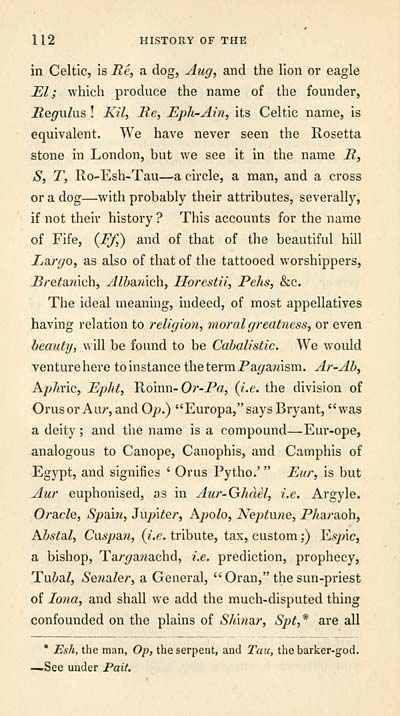Download files
Complete book:
Individual page:
Thumbnail gallery: Grid view | List view

112 HISTORY OF THE
in Celtic, is Re, a dog, Aug, and the lion or eagle
El; which produce the name of the founder,
Reg\il\is ! Kil, Re, Eph-Ain, its Celtic name, is
equivalent. We have never seen the Rosetta
stone in London, but we see it in the name i?,
S, T, Ro-Esh-Tau — a circle, a man, and a cross
or a dog — with probably their attributes, severally,
if not their history ? This accounts for the name
of Fife, {Ff,) and of that of the beautiful hill
Lsirgo, as also of that of the tattooed worshippers,
Bret3in\(t\\, Alh-a-mch, Horestii, Pehs, &c.
The ideal meaning, indeed, of most appellatives
having relation to religion, moral greatness, or even
beauty, will be found to be Cabalistic. We would
venture here to instance the term Pa^a?«ism. Ar-Ab,
Aphric, Epht, Roinn-Or-Pa, {i.e. the division of
Orusor Aur, and Op.) "Europa,"says Bryant, "was
a deity ; and the name is a compound — Eur-ope,
analogous to Canope, Canophis, and Camphis of
Egypt, and signifies ' Orus Pytho.' " Eur, is but
Aur euphonised, as in Aur-Ghdel, i.e. Argyle.
Ora.cle, Sp2dti, Jupiter, Apolo, Neptune, Phsa-aioh,
Absta.1, Cuspaji, {i.e. tribute, tax, custom ;) E.«/jic,
a bishop, Tar^awachd, i.e. prediction, prophecy.
Tubal, Senaler, a General, " Oran," the sun-priest
of lona, and shall we add the much-disputed thing
confounded on the plains of SKmar, Spt,* are all
* Esh, the man, Op, the serpent, and Tau, the barker-god.
— See under Pait.
in Celtic, is Re, a dog, Aug, and the lion or eagle
El; which produce the name of the founder,
Reg\il\is ! Kil, Re, Eph-Ain, its Celtic name, is
equivalent. We have never seen the Rosetta
stone in London, but we see it in the name i?,
S, T, Ro-Esh-Tau — a circle, a man, and a cross
or a dog — with probably their attributes, severally,
if not their history ? This accounts for the name
of Fife, {Ff,) and of that of the beautiful hill
Lsirgo, as also of that of the tattooed worshippers,
Bret3in\(t\\, Alh-a-mch, Horestii, Pehs, &c.
The ideal meaning, indeed, of most appellatives
having relation to religion, moral greatness, or even
beauty, will be found to be Cabalistic. We would
venture here to instance the term Pa^a?«ism. Ar-Ab,
Aphric, Epht, Roinn-Or-Pa, {i.e. the division of
Orusor Aur, and Op.) "Europa,"says Bryant, "was
a deity ; and the name is a compound — Eur-ope,
analogous to Canope, Canophis, and Camphis of
Egypt, and signifies ' Orus Pytho.' " Eur, is but
Aur euphonised, as in Aur-Ghdel, i.e. Argyle.
Ora.cle, Sp2dti, Jupiter, Apolo, Neptune, Phsa-aioh,
Absta.1, Cuspaji, {i.e. tribute, tax, custom ;) E.«/jic,
a bishop, Tar^awachd, i.e. prediction, prophecy.
Tubal, Senaler, a General, " Oran," the sun-priest
of lona, and shall we add the much-disputed thing
confounded on the plains of SKmar, Spt,* are all
* Esh, the man, Op, the serpent, and Tau, the barker-god.
— See under Pait.
Set display mode to: Large image | Transcription
Images and transcriptions on this page, including medium image downloads, may be used under the Creative Commons Attribution 4.0 International Licence unless otherwise stated. ![]()
| Early Gaelic Book Collections > Blair Collection > History of the Celtic language > (118) |
|---|
| Permanent URL | https://digital.nls.uk/76179907 |
|---|
| Description | A selection of books from a collection of more than 500 titles, mostly on religious and literary topics. Also includes some material dealing with other Celtic languages and societies. Collection created towards the end of the 19th century by Lady Evelyn Stewart Murray. |
|---|
| Description | Selected items from five 'Special and Named Printed Collections'. Includes books in Gaelic and other Celtic languages, works about the Gaels, their languages, literature, culture and history. |
|---|

